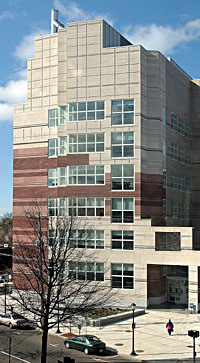 | The 300 Cedar St. building is part of Yale's $500 million investment in the School of Medicine. |
For many years, the School of Medicine struggled with a peculiar problem.
While its hundreds of world-renowned researchers and top graduate and postdoctoral students were bursting with new ideas and scientific advances, they were also literally bursting out of their physical space.
There simply wasn't enough room to handle the sheer amount of brain-power that existed within the walls of the Sterling Hall of Medicine and the various other medical school buildings dotting the area around Congress Avenue and Cedar Street.
On Friday, May 2, there will officially be more breathing room when the School of Medicine opens the doors to a new space that will dramatically expand its research and teaching facilities.
Officially known as 300 Cedar St., the new building includes a six-story south wing that will accommodate more than 700 researchers and a three-story north wing for 136 first-year medical and physician-associate students. Space beneath the lobby and the courtyard houses new core research facilities serving the entire university. These include the Animal Resources Center and the Magnetic Resonance Research Center, which is built to hold nine magnets for imaging studies of humans, animals and cells.
This expansion paves the way for recruitment of new faculty members and for current researchers to develop broader studies and to attract more grant money from private and government sources like the National Institutes of Health (NIH).
The new building will help ensure the enduring excellence of the Yale educational experience by providing continuous opportunity for innovation and improvement in those programs that enhance the University's role as an international center of learning. The building will also preserve access to a Yale education and provide resources necessary to maintain the excellence of its student body, the faculty and the academic programs.
Leading the grand opening day's events with a keynote speech will be NIH director Dr. Elias Adam Zerhouni, a renowned leader in the field of radiology and medicine who has run the $23 federal agency since 2002.
Before joining NIH, Zerhouni was executive vice dean of the Johns Hopkins University School of Medicine.There, he developed a comprehensive strategic plan for research and helped reorganize the school's academic leadership. He also led efforts to restructure the school of medicine's clinical practice association. Working with elected officials, he planned a major biotechnology research park and urban revitalization project near the Johns Hopkins medical campus. He also helped establish the Institute for Cell Engineering at Johns Hopkins to take advantage of the emerging fields of proteomics and stem cell research.
Since 2000, he has been a member of the National Academy of Sciences' Institute of Medicine. He has served on the National Cancer Institute's board of scientific advisers since 1998. In 1988, he was a consultant to the World Health Organization, and in 1985 he was a consultant to the White House under President Ronald Reagan.
His research accomplishments include developing computed tomography densitometry techniques that can help determine whether nodules found on the lung are benign or malignant.He also pioneered a way of assessing heart function via magnetic resonance imaging.
SPECIAL SUPPLEMENT: Building Strength in Biomedical Research & Education at 300 Cedar St.
T H I S
School of Medicine to open new
biomedical building on May 2 W E E K ' S
W E E K ' S S T O R I E S
S T O R I E S![]()
 School of Medicine to open new biomedical building on May 2
School of Medicine to open new biomedical building on May 2
![]()
![]()
 Initiative to focus on research ethics
Initiative to focus on research ethics
![]()
![]()
 Former Yale World Fellow played influential role . . .
Former Yale World Fellow played influential role . . .
![]()
![]()
 Two creative Kings discuss their crafts
Two creative Kings discuss their crafts Best-selling author Stephen King says 'everyday life' inspires him
Best-selling author Stephen King says 'everyday life' inspires him
![]()
 Songwriter Carole King describes how she makes beautiful music
Songwriter Carole King describes how she makes beautiful music
![]()
![]()
 Emerging global leaders chosen as Yale World Fellows
Emerging global leaders chosen as Yale World Fellows![]()
![]()
 Magazine celebrates its first year with award and acclaim
Magazine celebrates its first year with award and acclaim![]()
![]()
 Library acquires archive of 'storyteller with a camera'
Library acquires archive of 'storyteller with a camera'![]()
![]()
 IN FOCUS: Yale Astronomy Public Nights
IN FOCUS: Yale Astronomy Public Nights
![]()
![]()
 UNIVERSITY TEACH-INS
UNIVERSITY TEACH-INS Faculty members debate motivations behind the conflict
Faculty members debate motivations behind the conflict
![]()
 Panelists consider the difficulties of re-building a nation
Panelists consider the difficulties of re-building a nation
![]()
![]()
 Event will showcase research by medical school students
Event will showcase research by medical school students
![]()
![]()
 Art gallery appoints former MoMA administrator . . .
Art gallery appoints former MoMA administrator . . .
![]()
![]()
 Yale sophomore is lauded for her global leadership
Yale sophomore is lauded for her global leadership
![]()
![]()
 Memorial Services
Memorial Services
![]()
![]()
 Participants needed for CENTURY smoking cessation study
Participants needed for CENTURY smoking cessation study
![]()
![]()
 Peruvian archaeologists speak at Yale symposium on the Inca
Peruvian archaeologists speak at Yale symposium on the Inca
![]()
![]()
 Political science academy honors Yale professor and student
Political science academy honors Yale professor and student
![]()
Bulletin Home |
| Visiting on Campus
Visiting on Campus |
| Calendar of Events
Calendar of Events |
| In the News
In the News![]()
Bulletin Board |
| Yale Scoreboard
Yale Scoreboard |
| Classified Ads
Classified Ads |
| Search Archives
Search Archives |
| Deadlines
Deadlines![]()
Bulletin Staff |
| Public Affairs Home
Public Affairs Home |
| News Releases
News Releases |
| E-Mail Us
E-Mail Us |
| Yale Home Page
Yale Home Page